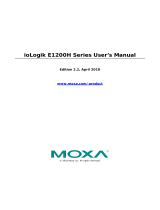
Table of Contents
Chapter 1. Overview ....................................................................................................1-1
What is the MXIO Linux Library? ....................................................................................... 1-2
Supported Platforms ............................................................................................................. 1-2
Supported I/O Modules ........................................................................................................ 1-2
Moxa Library Comparison ................................................................................................... 1-2
Chapter 2. Programming Flow....................................................................................2-1
Connecting to a Single Ethernet I/O..................................................................................... 2-2
Connecting to Multiple Ethernet I/O .................................................................................... 2-3
Connecting to a Single Serial I/O ......................................................................................... 2-4
Connecting to Multiple RS-485 I/O ..................................................................................... 2-5
Connecting to the ioLogik E2000 and Attached RS-485 I/O................................................ 2-6
Modbus Command Sets vs. Direct I/O Command Sets........................................................ 2-7
Modbus Command Sets................................................................................................ 2-7
Direct I/O Command Sets............................................................................................. 2-7
Chapter 3. MXIO API Overview ...................................................................................3-1
System Command Sets......................................................................................................... 3-2
RS-485/RS-232 I/O Connect Commands ..................................................................... 3-2
Ethernet I/O Connect Commands................................................................................. 3-2
General Commands ...................................................................................................... 3-2
Special Commands for ioLogik E2000, R2000 ............................................................ 3-2
Special Commands for ioLogik 4000 ........................................................................... 3-2
Modbus Command Sets........................................................................................................ 3-3
Direct I/O Command Sets..................................................................................................... 3-3
Digital Input Commands............................................................................................... 3-3
Digital Input Commands for ioLogik E2000, R2000 ................................................... 3-3
Digital Input / Output Mode Commands for ioLogik E2000........................................ 3-3
Counter Commands for ioLogik E2000, R2000 ........................................................... 3-4
Digital Output Commands............................................................................................ 3-4
Digital Output Commands for ioLogik E2000, R2000................................................. 3-5
Digital Output Commands for ioLogik 4000................................................................ 3-5
Pulse Output Commands for ioLogik E2000, R2000 ................................................... 3-5
Analog Input Commands.............................................................................................. 3-6
Analog Input Commands for ioLogik E2000, R2000................................................... 3-6
Analog Output Commands ........................................................................................... 3-6
Analog Output Commands for ioLogik E2000, R2000 ................................................ 3-7
Analog Output Commands for ioLogik 4000 ............................................................... 3-7
RTD Commands ........................................................................................................... 3-7
Thermocouple Commands............................................................................................ 3-8
Click&Go Logic Commands................................................................................................ 3-8
Active I/O Message Commands ........................................................................................... 3-8
Chapter 4. System Command Sets ............................................................................4-1
RS-232/RS-485 I/O Connect Commands............................................................................. 4-2
Ethernet I/O Connect Commands......................................................................................... 4-4
General Commands .............................................................................................................. 4-5
Special Commands for ioLogik E2000, R2000 .................................................................... 4-7
Special Commands for ioLogik 4000 ................................................................................... 4-7























